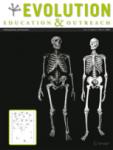
The latest issue of Evolution: Education and Outreach — the new journal aspiring to promote accurate understanding and comprehensive teaching of evolutionary theory for a wide audience — is now published. Devoted to human evolution and edited by William E. H. Harcourt Smith, the issue (volume 3, number 3) features Tom Gundling on "Human Origins Studies: A Historical Perspective"; Kieran P. McNulty on "Apes and Tricksters: The Evolution of Diversification of Humans' Closest Relatives"; Harcourt-Smith on "The First Hominins and the Origins of Bipedalism"; David S. Strait on "The Evolutionary History of the Australopiths"; Holly M. Dunsworth on "Origin of the Genus Homo"; Katerina Harvati on "Neanderthals"; Jason A. Hodgson and Todd R. Disotell on "Anthropological Genetics: Inferring the History of Our Species Through the Analysis of DNA"; Ian Tattersall on "The Rise of Modern Humans"; Monique Scott on "The Pleasures and Pitfalls of Teaching Human Evolution in the Museum" — and much more besides!
Also included is the latest installment of NCSE's regular column, Overcoming Obstacles to Evolution Education. In "Fossils that Change Everything We Know About Human Evolution (... Or Not)," NCSE's W. Eric Meikle and Andrew J. Petto explain, "Dramatic headlines touting new fossil discoveries often proclaim that our view of human evolution has been revolutionized. While this is occasionally the case, it is more often true that new fossils enrich our understanding of our own ancestry or answer scientific questions that could not be resolved with previous data. Even spectacular new discoveries, such as the now famous 'hobbit' skeleton (Homo floresiensis), can usually be included in the human family tree without any significant change in the inferences about the phylogenetic relationships or taxonomic status of the rest of its members. It is a testament to the power of evolutionary theory and the careful comparative study of human and other fossils that what we know about human evolution changes so little, even when spectacular new discoveries are announced."
